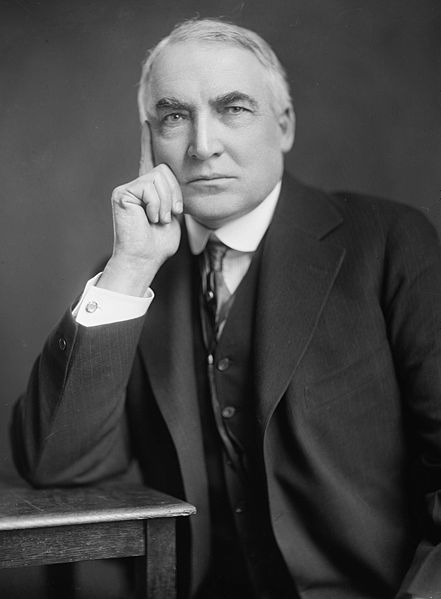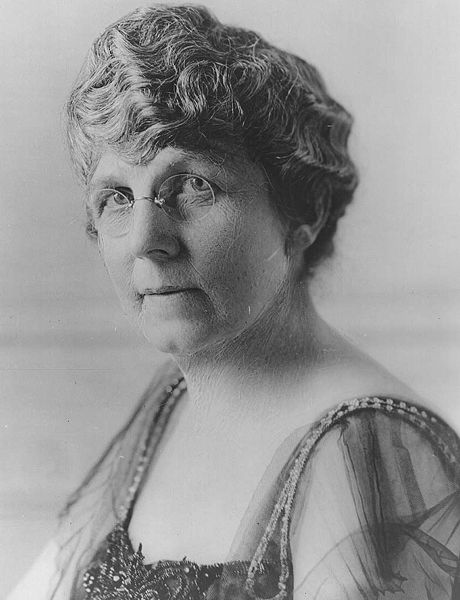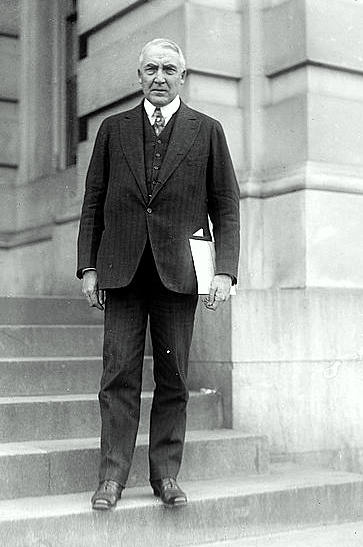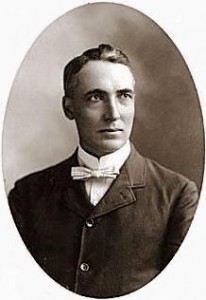| Warren G. Harding | |
|---|---|
 |
|
| 29th United States President « Previous Next » |
|
| In office | Mar. 4, 1921 – Aug. 2, 1923 |
| V. President | Calvin Coolidge |
| Political Party | Republican |
| Personal Info | |
| Born | Nov. 2, 1865 |
| Died | Aug. 2, 1923 (at age 57) |
| Religion | Baptist |
| School | Ohio Central College |
| Profession | Journalist |
| Signature | |
| Wife | Florence Kling |
| Children | Marshall (Step) |
| U.S. Presidents 26-35 | |
| 26. Theodore Roosevelt (1901-1909) | |
| 27. William H. Taft (1909-1913) | |
| 28. Woodrow Wilson (1913-1921) | |
| 29. Warren G. Harding (1921-1923) | |
| 30. Calvin Coolidge (1923-1929) | |
| 31. Herbert Hoover (1929-1933) | |
| 32. Franklin D. Roosevelt (1933-1945) | |
| 33. Harry S. Truman (1945-1953) | |
| 34. Dwight D. Eisenhower (1953-1961) | |
| 35. John F. Kennedy (1961-1963) | |
| List of All the Presidents |
Warren G. Harding is the 29th president of the United States. During his candidacy, he popularized the line “America’s present need is not heroics, but healing; not nostrums, but normalcy; not revolution, but restoration; not agitation, but adjustment; not surgery, but serenity; not the dramatic, but the dispassionate; not experiment, but equipoise; not submergence in internationality, but sustainment in triumphant nationality…” This small-town-man-turned-president served his country until his last breath.
Warren G. Harding’s Early Life
Warren Gamaliel Harding was born on November 2, 1865 in a farming village near Corsica (now Blooming Grove), Ohio. He was the son of doctors, Phoebe Elizabeth Dickerson-Harding and George Tyron Harding. When he was a child his family moved to the larger town of Caledonia in Marion, Ohio. Despite having parents who were professionals, he did farming chores. He was the typical small town man that loved to chat and mingle with the neighbors. He was intelligent. In fact, he did well in school and completed college at Ohio Central College.
After graduating, Warren Harding taught for a year. It was a most demanding job during that time. He also became an insurance salesman for a time. After these short term jobs, he went into the newspaper business and founded the Marion Star with two partners. He worked as the editor of his newspaper before he became the sole owner. Most of his writings were pro-Republican. By age 20, he worked as an orator and gave speeches in county and State Republican Conventions. He gave the nomination speech for President Howard Taft in 1912.
Marriage to Florence Kling
 During this time, Amos Kling, the richest man in Marion, took notice of this well-groomed, intelligent young man. He was against Harding having anything to do with his pianist daughter, Florence.
During this time, Amos Kling, the richest man in Marion, took notice of this well-groomed, intelligent young man. He was against Harding having anything to do with his pianist daughter, Florence.
Florence Kling DeWolfe was a recently divorced when she met Warren at a skating rink. She had a son from her previous marriage but gave custody to her estranged husband. After a year of courtship, Florence and Warren got married on July 8, 1891. The two never had a child. The couple became indifferent to Amos Kling when he spread the news that Warren had black ancestors. Because of his natural, lovable charm, Warren overcame the accusation.
Florence, whom Warren called Duchess, was the first who encouraged him to run for office in Ohio. He took his wife’s advice and won a seat at the Ohio State Senate. He served two terms as a state senator before he became a lieutenant governor. He ran for governor but lost the race.
Harry Daugherty, an Ohio politician, saw the potentials of a great leader in Warren Harding. He, together with the Duchess, led the campaign for Warren for the U.S. senate. After being out in public service for a long time, he surprisingly won and became a U.S. senator.
Running For President
 Most of his policies were being compared to Washington’s. The results of his policies were as successful. After 6 years serving in the senate, Harding filed candidacy for president under the Republican Party. He won by a landslide against James M. Cox, another native of Ohio. He received 404 electoral votes as opposed to Cox’s 127. He delivered his inaugural speech on March 4, 1921. He was the first president who gave a speech on a loudspeaker and the first newspaper publisher to become the United States president. His vice president was Calvin Coolidge, who succeeded him after he died.
Most of his policies were being compared to Washington’s. The results of his policies were as successful. After 6 years serving in the senate, Harding filed candidacy for president under the Republican Party. He won by a landslide against James M. Cox, another native of Ohio. He received 404 electoral votes as opposed to Cox’s 127. He delivered his inaugural speech on March 4, 1921. He was the first president who gave a speech on a loudspeaker and the first newspaper publisher to become the United States president. His vice president was Calvin Coolidge, who succeeded him after he died.
Harding’s term was one of the most controversial administrations in the United States presidency. Most Americans consider him as one of the worst presidents because of these controversies. He had affairs with other women, one of whom he had an illegitimate child with. His era marked arrival of the Depression and increased World Conflict. According to some historians, Warren Harding was one of the best presidents that America ever had.
During his first month, President Harding he approved the Thompson-Urrutia Treaty, which gave Columbia 25 million dollars as a reward for winning over Panama. He signed the Emergency Quota Act into law. This was meant to limit immigrants from residing in United States. Harding and his administration passed the Emergency Tariff Act which became later known as the Fordney-McCumber Tariff Act. The tariff act would serve as protection for all American products and to end the post-war recession.
 On May 31, 1921, Secretary of the Navy Edwin Denby transferred control for oil reserves in California and Teapot Dome, Wyoming to Secretary Albert B. Fall of Department of the Interior. This later caused a scandal and ruined the image of Harding’s administration. He also signed the Budget and Accounting Act. He was the first president that required all the government agencies to have a budget. On June 1921, the Budget and Accounting Act was able to establish the Bureau of the Budget and the General Accounting office under the Treasury Department. Harding was able to cut the government expense by one billion dollars.
On May 31, 1921, Secretary of the Navy Edwin Denby transferred control for oil reserves in California and Teapot Dome, Wyoming to Secretary Albert B. Fall of Department of the Interior. This later caused a scandal and ruined the image of Harding’s administration. He also signed the Budget and Accounting Act. He was the first president that required all the government agencies to have a budget. On June 1921, the Budget and Accounting Act was able to establish the Bureau of the Budget and the General Accounting office under the Treasury Department. Harding was able to cut the government expense by one billion dollars.
On July 2, 1921, President Harding signed a peace treaty with Germany and Austria, separately. At the end of World War I, many Americans were unemployed. On September 26 of 1921, Secretary of Commerce Herbert Hoover reported that approximately of 5.7 million Americans were out of work. It also during this time, that acts of violence were committed by the Ku Klux Klan (or, the KKK).
The president signed the Sheppard-Towner Maternity and Infancy Act. This act was the administration’s response to American women that did not have enough prenatal care.
Before his first year ended, Harding pardoned Eugene Debs and twenty-three others who were found guilty under the Espionage Act during WWI.
Most of Harding’s laws were for the protection of American farmers. By February 18, 1922, Harding signed the Capper-Volstead Act, which allowed farmers to buy and sell without crossing the anti-trust laws. It was during this time that silent birth of the Teapot Dome Scandal started. On April 7, 1922, Secretary Albert Fall leased the oil reserves to Harry Sinclair which would later become the talk of the nation.
To protect the budget of the government and to be able to pay the debt to veterans of the Great War, Harding rejected the Soldiers’ Bonus Bill. This Bill was later passed on to Calvin Coolidge. By September 22, Harding approved the Cable Act which allowed the married American women to retain their citizenship regardless of their husband’s nationality.
 1923 was the most forgettable year for Warren Harding. As early as January 2, 1923, the Teapot Dome Scandal unfolded. The president accepted the resignation of Secretary Albert Fall. After 27 days, Veterans’ Bureau Secretary Charles Forbes also resigned from his department. He was charged and convicted of fraud, conspiracy, and bribery. Because of this, the president was called corrupt. The Teapot Dome scandal became the days hottest topic, tarnishing the president’s reputation. Warren Harding, while may or may not have been involved, was vilified.
1923 was the most forgettable year for Warren Harding. As early as January 2, 1923, the Teapot Dome Scandal unfolded. The president accepted the resignation of Secretary Albert Fall. After 27 days, Veterans’ Bureau Secretary Charles Forbes also resigned from his department. He was charged and convicted of fraud, conspiracy, and bribery. Because of this, the president was called corrupt. The Teapot Dome scandal became the days hottest topic, tarnishing the president’s reputation. Warren Harding, while may or may not have been involved, was vilified.
On June 20, 1923, Warren Harding and his wife, Florence, left the White House to a retreat which they considered a voyage of understanding. The reason for this trip across Alaska and California was to compose the image and faith of the Harding administration despite the scandal they were facing.
Harding’s health was failing. He suffered from a ptomaine poisoning attack that later led to pneumonia. Though he seemed to be recovering, he still showed signs weakness. Prior to his trip, his condition did not allow to keep up the normal schedule of the office of the president.
On August 2, 1923, Warren Harding was found dead in his hotel room in San Francisco, California. His death was controversial because the real reason is still unknown. An autopsy on his body was declined by wife Florence. Speculations roamed over his death. Others claim that his wife poisoned him after she learned about his mistress and their love child. Others theorized that his wife didn’t want to expose a secret that was only to known to both of them. Some thought that he killed himself because he could not overcome the pressure of the scandals he was surrounded with.
His death prevented him from defending his administration from the controversies. Though his image was stained by the failed service of his administration, Warren Harding was still one of the most respected presidents of the United States. His actions and policies are reflected in the successes of the presidents after him.